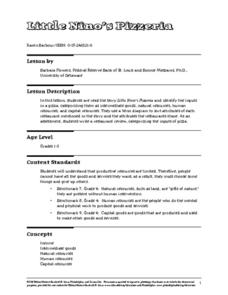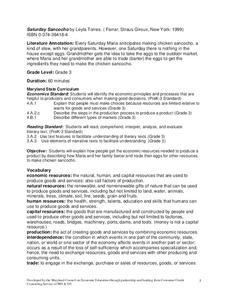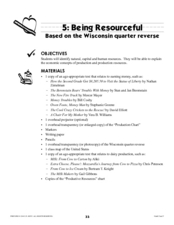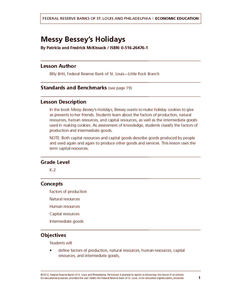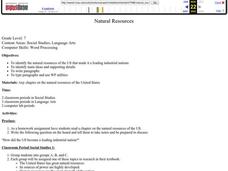Curated OER
Three Little Pigs: Human, Natural and Capital Resources
First and second graders will learn about natural, capital , and human resources through the story The Three Little Pigs. They will listen to the story, write down what they know about straw, wood, and brick, then complete a chart...
Education World
Human Nature- Good or Evil?
Students explore the philosophical nature of good vs. evil. In this literacy/philosophy lesson plan, students read and discuss media articles that illustrate human nature as inherently "good" or "evil." Students practice debating skills...
Carolina K-12
Factors of Production and Economic Decision-Making
Class members begin this engaging economics activity by listing all the resources used in producing a car and using that example to draw parallels to the four primary factors of production: capital goods, labor, natural resources, and...
K12 Reader
Natural Resources
What natural resources are available in your area? Your learners can consider this question after reading a brief passage about natural and renewable resources. After reading, class members respond to five questions related to the reading.
Curated OER
Human Evolution: Biology, Bones
Learners will love a weeks worth of bone study. They use bones and characteristics of bones to explore the evolution of hominoids. Bones are compared, categorized, and considered. A great way to bring physical anthropology and material...
Curated OER
Lemonade For Sale
2-3rd graders listen to the story, Lemonade for Sale, by Stuart J. Murphy. In the story, children produce and sell lemonade to raise money for their clubhouse, create a product, classify the resources used in production as natural...
Center for Entrepreneurship and Economic Education
Popcorn Economics
Scarcity of resources is a fundamental economics concepts that kids need to understand. You'll use a large bag of popcorn to demonstrate this concept. Have the class come up row-by-row to fill their snack bags with popcorn. By...
Alabama Learning Exchange
Good Litter, Bad Litter
Which ones can be thrown on the ground? Discover the difference between natural litter and unhealthy trash, helping scholars by using several examples. Use the information here to give them a basic background, but also encourage prior...
Curated OER
Beyond Good and Evil
In this online interactive philosophy worksheet, students respond to 10 short answer and essay questions about Beyond Good and Evil by Nietzsche. Students may check some of their answers on the...
Curated OER
The Human Footprint
For this environmental stewardship lesson, learners view the human footprint website and then answer 3 short answer questions related to human impact on the earth.
Federal Reserve Bank
Little Nino's Pizzeria
Engage your youngsters in basic economics by connecting the terms to dessert and pizza! After a discussion about intermediate goods and natural resources, learners read and connect a pizzeria to economic terms.
Curated OER
Saturday Sancocho
Second graders identify the economic principles and processes that are helpful to producers and consumers when making good decisions. Students will read, comprehend, interpret, analyze, and evaluate literary text as well as explain how...
Curated OER
Being Resourceful: Wisconsin quarter reverse
If your class understands goods and services then they'll be ready for this lesson on various resources. After reading a series of books and engaging in class lecture and discussion, pupils will fill out worksheets. They will list...
Federal Reserve Bank
Messy Bessey's Holidays
Teach your class some fairly complex terms—factors of production, human resources, capital resources, natural resources, and intermediate goods—with a storybook (Messy Bessey's Holidays), plenty of visuals and handouts, and related...
Curated OER
Salt of the Earth: A Caddo Industry in Arkansas
Middle schoolers explore the history of the Caddo Salt Industry found in Arkansas. Along with learning about how salt deposits formed in Arkansas, learners study the process of salt production and how valuable salt is as a natural...
Curated OER
Is It Ethical to Eat Meat?
Have your class join a blog about whether or not eating meat is good for you. They'll read several passages regarding meat processing and consumption, then they post what they think. There are six critical-thinking prompts to help them...
Curated OER
Little House In the Big Woods
Students explore economics by reading classic literature with their classmates. In this farm production lesson, students read the famous story Little House in the Big Woods by Laura Ingalls Wilder. Students complete handouts based upon...
Curated OER
Documents of Natural Rights: The Declaration of Independence and The Plan of Delano
Eighth graders analyze the philosophy of government in the Declaration of Independence. As a class, they discuss how this philosophy has caused other revolutions in history and how well it supports our natural rights. In groups, they...
Curated OER
The Struggle for Human Rights
Tenth graders identify and clarify a problem, an issue, or an inquiry. They identify the changing nature of families and women's roles in Canadian society. Pupils assess the interaction between Aboriginal people and Europeans. ...
Curated OER
As Good As Gold
Learners find examples of the Golden Ratio on the human body through measurement. Additionally, students learn about the use of the Golden Ratio and the Golden Rectangle in art and architecture. A very interesting lesson for the learners!
Curated OER
The Three Gorges: Should Nature or Technology Reign?
Students participate in a debate regarding the Three Gorges Dam in China. In this research skills lesson, students prepare for a debate regarding the construction of the Three Gorges Dam in China. Students participate in the dam taking...
Curated OER
Natural Resources
Seventh graders consider how US natural resources have helped it to become a leading industrialized power. They research, discuss, write and edit an expository paragraph in groups. They can present paragraph to another class or compile a...
Council for Economic Education
Teaching Economics Using Children's Literature
Introduce young learners to the subject of economics using their favorite stories and books. Including 24 separate lessons, this guide covers economic principles such as trade, scarcity, consumer goods and services, renewable and...
Curated OER
HABITAT for the other 90%
Learners examine the connection between the habitat needs of endemic species to the habitat needs of humans. In this habitat lesson high schoolers research the habitat requirements of a given family then develop an idea to improve...












